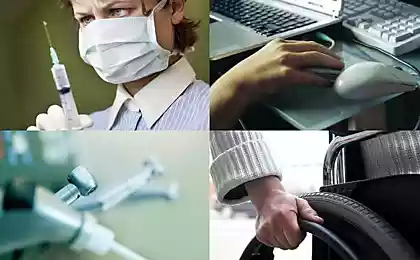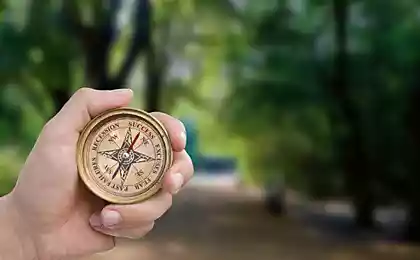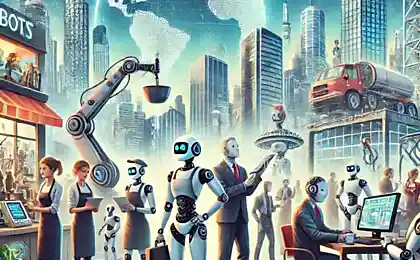752
The most nightmarish profession
Research scientists are often forced to take risks. Readings example of doctors who deliberately infected himself dangerous diseases, to fix their symptoms and test a new method of treatment. Sometimes these experiments ended in the death of a researcher.
The famous physicist and Nobel Prize winner, Maria Sklodowska-Curie became ill with leukemia after his experiments with radioactive materials. A little-known cases when researchers were forced to openly unpleasant experiments. British medical student Stubbins Firf \ Stubbins Ffirth (1784-1820) has brought his name into the annals of science. By studying yellow fever, he drank the blood and urine of patients ate their vomit, to determine the mechanism of infection.
Another example given the history of the twentieth century. Renowned surgeon Hungarian Miklos Nishli \ Miklos Nyiszli was a prisoner at Auschwitz and under the supervision of the infamous doctor Josef Mengele, the doctor fanatic, performed operations on inmates. Nishli not find the strength to refuse to comply with such orders, because he was firmly promised that in case of refusal, he lay down on the operating table. After the liberation of the concentration camps Nishli never picked up a scalpel.
American physicist William Weed \ William Weed interviewed more than a thousand scientists and based on their views compiled a list of the most unpleasant specializations in the field of science.
1. Developer of new fuels
Mankind can not live without energy. However, the development of new types of fuel - a process very long and laborious. For example, at the Lawrence Livermore National Laboratory \ Lawrence Livermore National Laboratory for 50 years conducting research of nuclear fuel, which theoretically could be used to build car engines. The researchers suggest that their finding will have to continue for at least 20 years. They compare themselves with the builders of medieval cathedrals, when the walls of the cathedral erected several generations of bricklayers.
2. Laboratory producing stool analysis dysentery
In the mid-1980s, scientists at the Virginia Institute of Technology studied the microbes that cause dysentery. To do this they had to examine tens of thousands of stool samples of patients with dysentery. In 1990, they created a company Techlab, which produces equipment for the appropriate tests and analyzes of samples that they send doctors. Three dozen employees of the company engaged exclusively in the fact that reveal the containers with feces, studying their color, odor, density and conduct microbiological analysis.
3. Laboratory analyzing sperm animals
Similar studies conducted in laboratories, producing research in biology, zoology and genetics. Despite the fact that in service technicians are special electronic device, the simplest and most effective method of stimulation is stimulation ejaculatory produced by hand. Some experiments require that the animal was not artificially Putting to sleep and was not under the influence of anesthesia. Especially hard for scientists who are forced to work with large animals such as elephants, bulls and lions.
4. Researcher mosquitoes
Biologists and physicians studying methods to combat malaria in the wild often forced, in the literal sense of the word, to pay for the knowledge of his own blood. They reveal portions of his body and offer them the malaria mosquito Anopheles as breakfast, lunch or dinner.
American researcher Helge Ziler \ Helge Zieler, who for two decades conducting similar studies in Brazil, estimates that in the field for a minute, she can catch (or kill) 17 mosquitoes. Theoretically, a person can be replaced by animal also attractive to mosquitoes - the best candidate is considered to be a pig. But in many countries against such treatment of pigs protest influential organizations defending the rights of animals.
5. Microbiologist, studying pathogens
Samples of microorganisms that can cause a fatal disease, usually placed in a specially protected room in which the researchers periodically have to go. It is particularly dangerous when the microorganisms may be in the form of an air suspension.
6. Tester confined spaces
This profession is not in the official documents, but nevertheless, such experts exist. They are, in particular, NASA \ NASA - which are manufactured and tested the spacecraft in which to live and work astronauts. Engineers and technicians who create spaceships, verify their integrity, security, and comfort for yourself. To do this, they must weeks bezvylazno dwell in the capsule of the spacecraft and maintain almost exactly the same way of life, which the astronauts are in orbit. By the way, the profession of astronaut scientists also recognized as one of the most unpleasant.
7. Criminologist sociologist
Scientists studying criminology, are often forced to carry out research in prisons. As a rule, prisoners interviewed students and students. Often, these interviews are conducted without protection, since it is believed that the prisoner saw the jailer, it behaves more constrained and is not to be frank. The struggle for the purity of a scientific experiment leads to the fact that many interviewers are victims of rapists directly in a prison cell.
8. Cleaner skeletons
Scientists and taxidermists often work with bones and skeletons of animals that previously required to clean from the remnants of flesh and blood. It uses a method of digestion of bones or remains of animals taken out into the yard, where they engaged in insects. In both cases, scientists are forced to endure the unbearable smell.
9. popularizer Metric
In the United States adopted the traditional British system of weights and measures, which uses miles, feet, pounds, Fahrenheit and a pint instead of meters, kilometers, kilograms, liters, and Celsius. In 1975, the US has decided to gradually switch to conventional metric system in the world, for which the National Institute of Standards and Technology \ National Institute Standards and Technology was established the branch. Life employees of this unit is extremely complicated - most of the time they spend on unpleasant conversations with representatives of the corporations and government officials, convincing them of the benefits of the metric system. In fact, they are engaged in advertising or trade, and science is in oblivion. So much so that at a press conference, the head of this department was not able to name your weight in kilograms.
10. Cryptozoology
Some rare species of birds and small animals are now considered extinct. But delete them from the list of the living at the zoologists hand does not rise. So, for example in Hawaii, acting special unit ornithologists, which is trying to catch the rare birds that were not seen in at least two decades. In search of the birds every day they go out every day and come back with empty cells.
11. Executioner frogs
Many medical and biological faculties and many laboratories conducted experiments on frogs. In particular, we study their reflections, and especially of the nervous system. Leaders such laboratories are forced to take on an unpleasant mission - continuing the execution of hundreds of thousands of experimental frogs.
12. Ichthyologist - bookkeeper
One of the most sordid duties ichthyologist - to count fish. The most difficult to do this during spawning tens of thousands of fish pass before the eyes of the river and the scientist need to calculate them and simultaneously determine their affiliation to one or another form. After the end of the spawning ichthyologists long can not get rid of the image of fish, constantly jumping in front of them.
13. Taster odors
People who rate the quality of the smell of the product, are working in the perfume, pharmaceutical and food companies. Sometimes they are forced to make sacrifices - do not bathe for weeks to check how the new pattern of cologne or deodorant discourage unpleasant smell.
But there are no limits of scientific feat. American gastroenterologist Michael Levitt \ Michael Levitt is analyzing the gases are periodically allocated to a person after a meal. Levitt has developed a special device (a plastic bag, tightly attached to the anus), with which he was able to save gas for a long time and create a scientific collection. Courageous Volunteers different feeds gastroenterologist food collects allocations of gases in the bags and evaluates tests for smell, using their own nose. Dr. Levitt argues that the analysis of the "gas component" in the near future will allow the diagnosis of many diseases of the stomach and intestines.
From
The famous physicist and Nobel Prize winner, Maria Sklodowska-Curie became ill with leukemia after his experiments with radioactive materials. A little-known cases when researchers were forced to openly unpleasant experiments. British medical student Stubbins Firf \ Stubbins Ffirth (1784-1820) has brought his name into the annals of science. By studying yellow fever, he drank the blood and urine of patients ate their vomit, to determine the mechanism of infection.
Another example given the history of the twentieth century. Renowned surgeon Hungarian Miklos Nishli \ Miklos Nyiszli was a prisoner at Auschwitz and under the supervision of the infamous doctor Josef Mengele, the doctor fanatic, performed operations on inmates. Nishli not find the strength to refuse to comply with such orders, because he was firmly promised that in case of refusal, he lay down on the operating table. After the liberation of the concentration camps Nishli never picked up a scalpel.
American physicist William Weed \ William Weed interviewed more than a thousand scientists and based on their views compiled a list of the most unpleasant specializations in the field of science.
1. Developer of new fuels
Mankind can not live without energy. However, the development of new types of fuel - a process very long and laborious. For example, at the Lawrence Livermore National Laboratory \ Lawrence Livermore National Laboratory for 50 years conducting research of nuclear fuel, which theoretically could be used to build car engines. The researchers suggest that their finding will have to continue for at least 20 years. They compare themselves with the builders of medieval cathedrals, when the walls of the cathedral erected several generations of bricklayers.
2. Laboratory producing stool analysis dysentery
In the mid-1980s, scientists at the Virginia Institute of Technology studied the microbes that cause dysentery. To do this they had to examine tens of thousands of stool samples of patients with dysentery. In 1990, they created a company Techlab, which produces equipment for the appropriate tests and analyzes of samples that they send doctors. Three dozen employees of the company engaged exclusively in the fact that reveal the containers with feces, studying their color, odor, density and conduct microbiological analysis.
3. Laboratory analyzing sperm animals
Similar studies conducted in laboratories, producing research in biology, zoology and genetics. Despite the fact that in service technicians are special electronic device, the simplest and most effective method of stimulation is stimulation ejaculatory produced by hand. Some experiments require that the animal was not artificially Putting to sleep and was not under the influence of anesthesia. Especially hard for scientists who are forced to work with large animals such as elephants, bulls and lions.
4. Researcher mosquitoes
Biologists and physicians studying methods to combat malaria in the wild often forced, in the literal sense of the word, to pay for the knowledge of his own blood. They reveal portions of his body and offer them the malaria mosquito Anopheles as breakfast, lunch or dinner.
American researcher Helge Ziler \ Helge Zieler, who for two decades conducting similar studies in Brazil, estimates that in the field for a minute, she can catch (or kill) 17 mosquitoes. Theoretically, a person can be replaced by animal also attractive to mosquitoes - the best candidate is considered to be a pig. But in many countries against such treatment of pigs protest influential organizations defending the rights of animals.
5. Microbiologist, studying pathogens
Samples of microorganisms that can cause a fatal disease, usually placed in a specially protected room in which the researchers periodically have to go. It is particularly dangerous when the microorganisms may be in the form of an air suspension.
6. Tester confined spaces
This profession is not in the official documents, but nevertheless, such experts exist. They are, in particular, NASA \ NASA - which are manufactured and tested the spacecraft in which to live and work astronauts. Engineers and technicians who create spaceships, verify their integrity, security, and comfort for yourself. To do this, they must weeks bezvylazno dwell in the capsule of the spacecraft and maintain almost exactly the same way of life, which the astronauts are in orbit. By the way, the profession of astronaut scientists also recognized as one of the most unpleasant.
7. Criminologist sociologist
Scientists studying criminology, are often forced to carry out research in prisons. As a rule, prisoners interviewed students and students. Often, these interviews are conducted without protection, since it is believed that the prisoner saw the jailer, it behaves more constrained and is not to be frank. The struggle for the purity of a scientific experiment leads to the fact that many interviewers are victims of rapists directly in a prison cell.
8. Cleaner skeletons
Scientists and taxidermists often work with bones and skeletons of animals that previously required to clean from the remnants of flesh and blood. It uses a method of digestion of bones or remains of animals taken out into the yard, where they engaged in insects. In both cases, scientists are forced to endure the unbearable smell.
9. popularizer Metric
In the United States adopted the traditional British system of weights and measures, which uses miles, feet, pounds, Fahrenheit and a pint instead of meters, kilometers, kilograms, liters, and Celsius. In 1975, the US has decided to gradually switch to conventional metric system in the world, for which the National Institute of Standards and Technology \ National Institute Standards and Technology was established the branch. Life employees of this unit is extremely complicated - most of the time they spend on unpleasant conversations with representatives of the corporations and government officials, convincing them of the benefits of the metric system. In fact, they are engaged in advertising or trade, and science is in oblivion. So much so that at a press conference, the head of this department was not able to name your weight in kilograms.
10. Cryptozoology
Some rare species of birds and small animals are now considered extinct. But delete them from the list of the living at the zoologists hand does not rise. So, for example in Hawaii, acting special unit ornithologists, which is trying to catch the rare birds that were not seen in at least two decades. In search of the birds every day they go out every day and come back with empty cells.
11. Executioner frogs
Many medical and biological faculties and many laboratories conducted experiments on frogs. In particular, we study their reflections, and especially of the nervous system. Leaders such laboratories are forced to take on an unpleasant mission - continuing the execution of hundreds of thousands of experimental frogs.
12. Ichthyologist - bookkeeper
One of the most sordid duties ichthyologist - to count fish. The most difficult to do this during spawning tens of thousands of fish pass before the eyes of the river and the scientist need to calculate them and simultaneously determine their affiliation to one or another form. After the end of the spawning ichthyologists long can not get rid of the image of fish, constantly jumping in front of them.
13. Taster odors
People who rate the quality of the smell of the product, are working in the perfume, pharmaceutical and food companies. Sometimes they are forced to make sacrifices - do not bathe for weeks to check how the new pattern of cologne or deodorant discourage unpleasant smell.
But there are no limits of scientific feat. American gastroenterologist Michael Levitt \ Michael Levitt is analyzing the gases are periodically allocated to a person after a meal. Levitt has developed a special device (a plastic bag, tightly attached to the anus), with which he was able to save gas for a long time and create a scientific collection. Courageous Volunteers different feeds gastroenterologist food collects allocations of gases in the bags and evaluates tests for smell, using their own nose. Dr. Levitt argues that the analysis of the "gas component" in the near future will allow the diagnosis of many diseases of the stomach and intestines.
From
























